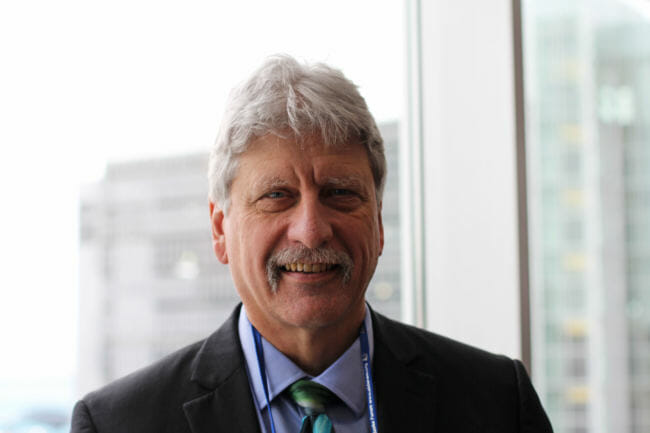
The U.S. Environmental Protection Agency (EPA) has a big part to play in some very controversial issues in Alaska and beyond, from the proposed Pebble Mine to national climate policy.
The Trump administration recently appointed Chris Hladick to lead EPA Region 10. Hladick will oversee EPA’s work in Alaska, as well as in Washington, Oregon and Idaho.
Alaska’s Energy Desk got a chance to catch up with Hladick at the Alaska Forum on the Environment conference in Anchorage this week. In a wide-ranging interview, Hladick answered questions about the agency’s recent Pebble Mine decision, EPA’s budget and climate change.
Before landing his federal post, Chris Hladick spent a lot of time at various levels of government in Alaska. Most recently, Hladick was a member of Governor Bill Walker’s cabinet, serving as commerce commissioner. Before that, he worked for the cities of Unalaska, Dillingham and Galena.
Hladick thinks that experience will come in handy:
“I bring to the table local knowledge of how things can actually work on the ground here in Alaska,” Hladick said.
Hladick said his boss — EPA administrator Scott Pruitt — recently called him up seeking some of that local knowledge, on a hot topic for many Alaskans: the proposed Pebble Mine.
“He was interested in knowing how many people the commercial fishing out there employs, as opposed to what the mine will employ. I think he went through a process in his mind of weighing all the issues together,” Hladick said.
Shortly after that conversation, Pruitt made news: he decided to keep in play EPA’s proposal to put environmental restrictions on the mine, a move that surprised and thrilled Pebble’s opponents.
Hladick declined to speculate how Pruitt came to the decision.
“I think you’d have to ask him that,” Hladick said.
Hladick said despite Pruitt’s decision, EPA is keeping busy with Pebble. The company still aims to get its permits, so EPA is working with the Army Corps of Engineers as it prepares an environmental impact statement for the mine.
That’s just one of many big projects EPA is involved with in Alaska. Others include the Donlin mine and the Nanushuk project, a big North Slope oil development. EPA also provides millions of dollars in grant funding for projects in Alaskan communities and tribal villages, including grants to help with drinking water infrastructure and cleaning up Superfund sites.
Meanwhile, the Trump administration just proposed steep budget cuts for EPA as a whole, reducing its funding by more than a quarter and eliminating thousands of jobs at the agency. Hladick didn’t criticize the cuts, saying part of his job is to figure out how to do “more with less.”
“Our workload is expanding while our budgets are decreasing, so we have to make sure we focus on the right things,” Hladick said.
Hladick noted that last year, Congress didn’t go through with all the cuts the Trump administration requested, and he expects the same thing to happen again this year. But Hladick did acknowledge that if Congress went through with budget as proposed, it would impact EPA’s work in the region.
“If there’s a 30 percent cut, I think everybody will feel it. That’s a lot of money,” Hladick said.
In the document outlining its proposed budget, EPA touts the cuts, saying it’s “proud to be a good steward of taxpayer resources and to efficiently deliver environmental protection.”
Environmental groups, on the other hand, criticized the budget proposal, saying it would endanger the environment and public health.
Environmental groups are also slamming Trump’s EPA for its approach to climate change. Pruitt questions the extent to which human activity is causing climate change, and under him, EPA is walking back Obama-era proposals to regulate greenhouse gases.
Being from Alaska, Hladick said he can’t deny climate change is an issue.
“I’ve been involved in Arctic issues since at least 16 years ago, and there’s no doubt the Arctic is changing,” Hladick said.
EPA may be stepping away from its Obama-era focus on regulating greenhouse gases, but Hladick said he wants the agency to continue working with communities seeing on-the-ground impacts from global warming.
Elizabeth Harball is a reporter with Alaska's Energy Desk, covering Alaska’s oil and gas industry and environmental policy. She is a contributor to the Energy Desk’s Midnight Oil podcast series. Before moving to Alaska in 2016, Harball worked at E&E News in Washington, D.C., where she covered federal and state climate change policy. Originally from Kalispell, Montana, Harball is a graduate of Columbia University Graduate School of Journalism.




